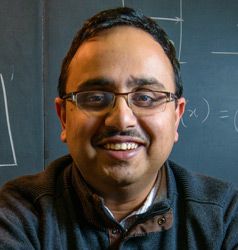Three of Lehigh’s outstanding young professors – Arindam Banerjee and Nader Motee of mechanical engineering and mechanics, and Bryan Berger of chemical and biomolecular engineering -- have received a significant boost to their research endeavors, courtesy of the National Science Foundation (NSF) CAREER Awards.
The NSF CAREER program is considered one of the most prestigious awards granted by the NSF. They are awarded annually in support of junior faculty members across the U.S. who exemplify the role of teacher-scholars through outstanding research, excellent education and the integration of education and research. Each award provides stable support at the level of approximately $500,000 for a five year period. The three professors join an active and successful group of Lehigh engineering faculty who have received NSF CAREER Awards.
Mixing with a twist
“My field of study is all around, anywhere you look-- the way coffee and creamer swirl together, for example,” explains Arindam Banerjee, P.C. Rossin Assistant Professor of Mechanical Engineering and Mechanics. In the lab, he directs his focus of study towards on the ways that fluids and other materials mix with each other. Mixing of mass, momentum and energy in complex flows, often under extreme pressure and temperature conditions, has widespread application in engineering, ranging from astrophysics to geophysical flows. Banerjee’s interest in extreme mixing comes from the need of understanding the effects of turbulent mixing in inertial confinement fusion capsules.
More specifically, Banerjee's work has explored concept of the Rayleigh Taylor instability, a fluid instability that occurs on the interface between two fluids or materials of different densities, with the lighter fluid pushing the heavier fluid. Traditionally, Rayleigh Taylor instability has been studied under constant acceleration, a condition that occurs in geophysical applications. Banerjee's NSF CAREER project will explore Rayleigh Taylor instability under "variable and reversible acceleration," using an in-house experiment housed in Packard Laboratory and synergistic simulations that will be performed in collaboration with Los Alamos National Laboratory. Overall, Banerjee hopes to develop new tools for control of turbulence transport and mixing, with implications for all fields of fluid dynamics including multi-phase flows, heat transfer and combustion. His work is supported by funding from U.S. Department of Energy, NSF and Los Alamos National Lab.
Better medicine
It is estimated that more than 40% of all currently developed drugs fail in preclinical evaluation due to low drug solubility, which reduces in vivo bioavailability and results in poor overall drug efficacy. Bryan Berger, former P.C. Rossin Assistant Professor of Chemical and Biomolecular Engineering, is seeking to drastically improve this situation through "Scalable Biosurfactant Synthesis." This method enables engineering of biosurfactants for specific applications through screening and selection from cell culture as well as simplifies downstream recovery and purification steps after synthesis. The technique provides for scalable, constitutive expression, and can be tailored to biomedical, food, cosmetics, materials, energy or other key applications.
In 2013, earlier work on this project was awarded a National Innovation Award at TechConnect World, the world's largest multi-disciplinary multi-sector conference and marketplace of vetted innovations, innovators and technology business developers and funders. The TechConnect World conference is held in conjunction with the National Innovation Summit and Showcase. In support of the White House and Congressional calls for innovation commercialization initiatives, the Showcase celebrates the Nation's top innovations supported through federal funding programs.
Keeping the dominoes standing
Nader Motee, P.C. Rossin Assistant Professor of Mechanical Engineering and Mechanics, has worked extensively in the fields of distributed control and dynamical systems. His research explores connections between various metrics for performance and fragility of large-scale dynamical networks, and, as he puts it, "how emergence of fundamental limits and tradeoffs on performance and fragility depends on the interconnection topology in a dynamical network."
The field, he says, is a rapidly growing branch of engineering. “A networked system can really be anything,” he explains. "It can range from Facebook to a power grid, and what makes it so interesting to study is the relationship every node in a network has with other nodes." Most real-world networks have an inherently undesirable feature, usually referred to as cascading failure or a domino effect: if a node endures an external shock, there is a chance that the system may collapse. Motee’s research, one could imagine, focuses on determining why the dominoes "line up" and how the first "domino" may fall.
Motee’s goal is to find and understand the conditions of networks that could make them fragile, and then identify the triggers for possible cascading failure. Large-scale, crucial networks are precarious and interdependent, and there exists a huge research gap between theory and practice – a situation Motee is addressing through his research. "This is absolutely theoretical work," he comments. "We're trying to pave the way for future researchers and practitioners to use what we develop to understand and apply it physically."


